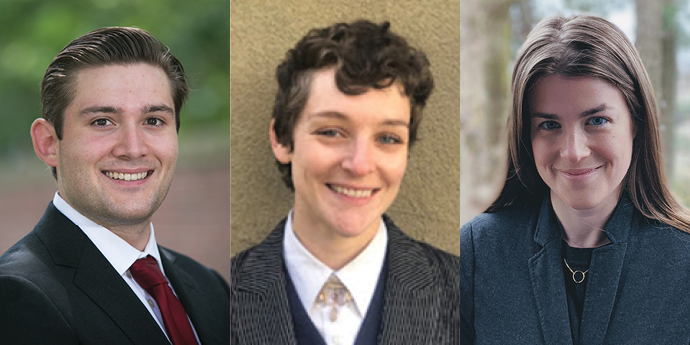The Rappaport Center for Law and Public Policy Fellowship Program, now in its 20th year, has over 220 alumni Fellows, working throughout the United States in myriad public, academic, judicial, and private positions. The program attracts law students from across Massachusetts who want to learn about the intersection of law and public policy. The 10-week intensive summer Fellowship program provides gifted law students with the opportunity to experience the intricacies and rewards of public service within the highest levels of local and state governments. Throughout the summer, Fellows are introduced to the ways law and public policy impact the quality of life in our communities, state, and region. For many Fellows, their experience inspires them to continue the vital law and policy work related to their summer placement--well beyond the program’s duration.
For the first time since the establishment of the Fellowship Program, the Rappaport Center for Law and Public Policy is pleased to announce that grants to support research related to the Fellows’ internships have been awarded to three 2020 Fellows. The grant is designed to assist Fellows in undertaking research that contributes positively to law and public policy and advances their academic pursuits. Fellows will conduct their research, with support and mentorship from the Rappaport Center Faculty Director and Boston College Law School Professor Daniel Kanstroom, throughout the 2020-2021 academic year.
The 2020 inaugural grant recipients are Kristopher Phipps, Kristen Rosa, and Rachael Wyant.
Kristopher Phipps, a rising 2L at Boston College Law School, interned at the Massachusetts Inspector General’s Office (OIG) this summer. Phipps’ work with OIG provided him with a deep understanding of the importance of the Office’s independent nature and how such an agency is crucial to oversee the workings of the government as a whole. When five inspectors general were ordered to be fired at the federal level amidst a global pandemic, Phipps’ interest grew as his summer experience coincided with what he was witnessing at the state level. “The contrast between the two levels of government when it comes to oversight is striking, and comparing the two is especially timely given the current status of the pandemic response efforts,” Phipps expressed. For his research, he will examine the current institutional design of federal inspectors general in comparison to those on the state level.
Kristen Rosa, a rising 2L at Boston College Law School, was a Fellow at the Department of Elementary and Secondary Education (DESE) this summer. Rosa explained that there are two rights a state education agency (SEA) must weigh in response to a request for information: the public’s right to know, and a student’s right to privacy. In Massachusetts, however, there is no consistent standard for how to effectively prevent derivative disclosures without compromising the ability of the SEA to respond to records requests in a timely manner. For her research, Rosa will examine derivative disclosure regulations under both federal and state law and propose clear, consistent standards for a meaningful policy that balances the interests of protecting student information and government regulations.
Rachael Wyant, a rising 2L at Northeastern University School of Law, spent her summer in the Office of State Senator Joan Lovely. While interning at the state senate, Wyant witnessed the consequences of the global pandemic, which had many constituents struggling with unemployment benefits, reopening protocols, and threats to their housing and livelihoods. The unprecedented circumstances also raised significant controversy regarding Governor Baker’s executive orders resulting in elected officials being required to contend with the ambiguity of legal authority during a state of emergency. Wyant stated, “Seeing these issues from a variety of perspectives inspired me to explore the bounds of executive power during a pandemic and consider policies that would empower the Governor and legislature to act quickly and effectively to protect communities and survive constitutional challenges during future public health emergencies.” For her research, she will delve into the role and constraints of executive powers in a public health emergency, highlighting the particular constitutional issues emerging in Massachusetts as Governor Baker extends the COVID-19 state of emergency and issues executive orders under the Civil Defense Act of 1950 (CDA).



